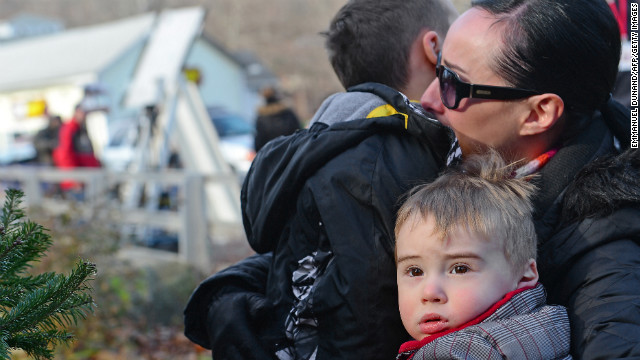This story was first published by CNN.
Editor’s note: Former CNN correspondent Pat Etheridge is a journalist specializing in children’s health and family issues. She previously hosted CNN’s “Parenting Today.”
(CNN) — The anguish is unimaginable. In the midst of their own loss, grief-stricken parents in Newtown, Connecticut, now struggle for ways to comfort their children: What to say? How to react? What to watch for in the child?
“The first thing adults need to do is find some reinforcement for themselves because the best people to help these children are the people who take care of them in their daily lives, especially parents,” says Dr. Lewis Leavitt, professor emeritus of pediatrics at University of Wisconsin-Madison.
 “The analogy I use is one you hear on an airplane: Put the mask on yourself first, so you can then attend to your child,” says Dr. John B. Lochridge, an Atlanta-based child and family psychiatrist. “After that, it is minute by minute, case by case. It’s really a matter of listening and responding in a way that fits the framework of their understanding.”
“The analogy I use is one you hear on an airplane: Put the mask on yourself first, so you can then attend to your child,” says Dr. John B. Lochridge, an Atlanta-based child and family psychiatrist. “After that, it is minute by minute, case by case. It’s really a matter of listening and responding in a way that fits the framework of their understanding.”
Civic and church groups as well as individual counselors and pediatricians can offer crucial support for parents. “The divorce rate is incredibly high following the death of a child, especially a tragic death. One of the most important things you can do is focus on communicating with your spouse and getting the help you need to keep the family unit intact,” Lochridge says.
“It’s key for children to know that their parents are there for them, can protect them, and that they are safe,” says Leavitt, also author of “When Terrible Things Happen,” a booklet for parents released shortly after September 11, 2001.
To help kids with tragedy, slow down, listen
Children have different emotional needs than adults. Also, at different ages and stages of development, they react in different ways. Leavitt and Lochridge offer age-specific advice for children directly affected — or indirectly traumatized by exposure through conversation or media.
Infants and toddlers (0-3 years)
Infants and toddlers cannot comprehend how a tragedy might change their environment. But they can recognize and respond to changes in adult behavior. What they need most after a loss is their parents’ loving care. Focus on the familiar and resume normal activities. “The games you played and the stories you read before are still appropriate afterwards,” advises Leavitt.
Preschool children (3-5 years)
Preschoolers may not talk about their feelings even when asked. They require reassurance from parents and family members about their care and safety. Playing music or doing arts and crafts may help children open up.
It’s best to respond with answers that are simple and direct. For example, if your child asks, “Do people wake up after they die?” You could answer, “People do not wake up after they die, but it’s OK to think about people we like even when they are not with us anymore.” Also, it is important to avoid television viewing. “Young children may think a disaster is happening again and again if they see repeated images,” cautions Lochridge.
School-age children (5-12 years)
Children at this stage have more interest and understanding of how and why things happen. Parents can help by talking, listening and answering their questions. Honest, direct responses coupled with reassurance are best.
For instance, if your child asks, “Mom, are you sad?” You could say, “I’m sad about what happened, but I’m happy we are together.” Again, it is best to limit TV or watch together and discuss what has happened. School-age children benefit by returning to their normal activities and routines.
Behavior to watch
Changes in your child’s behavior may signal anxiety. Contact a health professional if problems such as these persist more than a few weeks:
— Preschoolers: bedwetting, thumb-sucking or increased clinginess
— School-age children: sleep disturbances, nightmares, poor concentration, aches and pains
— Teenagers: expressions of anger or sadness, problems with eating and sleeping, loss of interest in activities, new difficulties at school
Therapy
For children under stress after a traumatic event, various forms of therapy can help, including art.
“Anything that’s available — clay, crayons, music — children can use to express themselves,” says Susan Anderson, founder of theArtReach Foundation. Her nonprofit group was on the ground in Tuzla, Bosnia, following a massacre that killed 71 — many of them schoolchildren.
“This is a time when we are at a loss for words. Parents should understand and share with their children that sometimes, there is no simply explanation,” Lochridge offers.
“In an event of this scope, it’s important for parents, police, even the president to convey that this is a terrible but rare event and our institutions are there to keep them safe,” says Leavitt.
He suggests creating opportunities that enable youngsters to look “beyond the memorials for the lost children — which are important — to more long-term activities that aim for solutions and a secure future.”
So what of the magic of Christmas in Newtown? The magic is not lost, says Leavitt. “Part of that magic is exactly what will help these children heal: togetherness, unity and the spirit of goodness in the world.”
Photo courtesy of CNN.



























